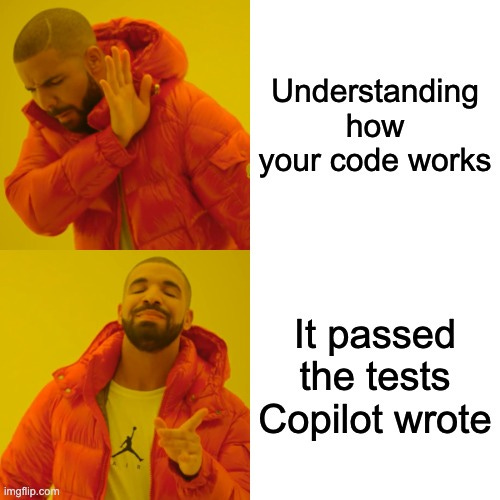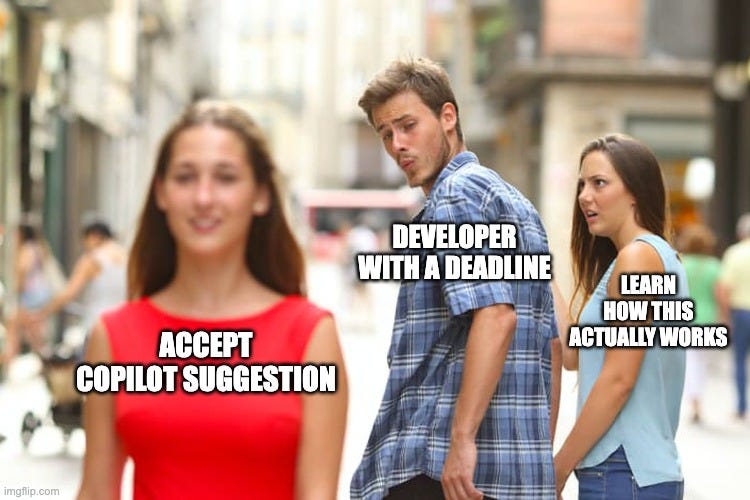Why Your AI Code Assistant Makes You a Worse Developer
And How to Use It Without Becoming a Coding Zombie
Look, we need to talk about what's happening with AI coding assistants. Not the productivity gains or the metrics everyone loves to quote. The real shit that's breaking under the surface.
The Problem Everyone's Talking About (But Not Fixing)
Every developer I talk to says the same thing: "AI makes me so much faster." Yeah, no shit. But faster at what exactly?
You're shipping more code. Your PRs are bigger. Your velocity looks incredible on those sprint reports. But here's what's actually happening: you're forgetting how to code.
I'm not talking about syntax. I'm talking about the actual thinking part. The part where you translate a problem into a solution. The part where you understand what you're building.
We're Creating a Generation of Copy-Paste Engineers
Think about your last week of coding. How many times did you:
Accept a Copilot suggestion without really reading it
Let the AI write your entire function while you watched
Skip thinking through the problem because the AI "got it"
Approve a PR because "the AI-generated code looks fine"
This isn't using AI. This is being used by AI.
The worst part? Most developers don't even realise it's happening. It's like slowly going deaf. You don't notice until you're in a situation where you actually need to hear, and suddenly you can't.
The Three Stages of Becoming Useless
Stage 1: The Honeymoon
You discover Copilot or Cursor. Holy shit, this is amazing. You're flying through tickets. You still understand everything, you're just faster. This is what everyone thinks AI coding is. It lasts about three months.
Stage 2: The Delegation
Why write boilerplate? Why implement that sorting algorithm? The AI does it perfectly. You start accepting suggestions without deep review. Your mental model of your own codebase gets fuzzy. You stop considering alternatives because the first suggestion "works."
Stage 3: The Dependency
You literally cannot implement features without AI anymore. Your debugging skills are gone. You can't estimate complexity because you've never built the mental model. You're not a developer anymore. You're a manager. Of code you don't understand.
The MIT Study Everyone Gets Wrong
Yeah, there's research showing ChatGPT makes students perform worse on tests without it. Everyone acts surprised. "AI is making us dumber!"
No. Using AI instead of thinking makes you weaker. It's like using a forklift to move everything and then wondering why you can't lift a box.
The problem isn't AI. The problem is developers treating it like a replacement for understanding rather than a tool for acceleration.
Why This Actually Matters
Software isn't like other fields. When a writer uses AI for grammar help, they still understand their ideas. When you use AI to write code you don't understand, you're adding complexity you can't manage.
Here's what happens:
The Bug You Can't Fix Your AI-generated code has a subtle race condition. The AI can't figure it out because it lacks your system's context. You can't figure it out because you never understood the implementation. Now you're fucked.
The Performance Problem You Can't See That elegant solution Copilot suggested? It's quadratic complexity hiding behind clean syntax. But you never developed the intuition to spot this because you've been accepting suggestions blindly.
The Security Hole You Don't Know Exists AI trains on public code, including vulnerable code. Without deep understanding, you can't evaluate whether that convenient authentication pattern is actually secure.
"But I Only Use It for Boilerplate"
Bullshit.
First, if you're writing that much boilerplate, your architecture sucks. Fix that instead.
Second, boilerplate is where junior developers learn. It's where you build muscle memory. It's where you start seeing patterns and thinking "there has to be a better way."
Every time you delegate boilerplate to AI, you miss the chance to:
Question why that pattern exists
Build mental pathways that make you naturally faster
Develop opinions about better approaches
Actually understand your codebase
The best engineers got good by writing tons of boilerplate, getting pissed off about it, and building better abstractions. AI removes the frustration. And with it, the growth.
Test Yourself Right Now
Turn off all AI assistance and try to:
Implement a new feature from scratch
Debug a production issue
Review a PR and provide meaningful feedback
Estimate how long a task will take
Explain your architectural decisions
If any of these are hard, you're not using AI to enhance your abilities. You're using it to hide their absence.
How to Use AI Without Becoming Useless
The solution isn't to stop using AI. That's stupid. The solution is to use it intentionally.
Write First, Then Compare Implement your solution first. Then check what AI suggests. Learn from the differences, don't just copy them.
The Explanation Test If you can't explain every line of AI-generated code to a junior developer, you don't understand it. Delete it and write it yourself.
Weekly Detox One day a week, no AI. Yes, you'll be slower. That's the point. It's like runners doing hill training.
Debug Manually First Twenty minutes minimum on any bug before asking AI. Build hypotheses. Test them. Understand the problem space. Then use AI for additional perspectives, not answers.
Never Delegate Architecture System design, architectural decisions, technology choices. These require understanding trade-offs that AI cannot evaluate. This is your job. Do it.
The Split That's Coming
The industry is about to split into two groups:
Group 1: AI-Dependent Developers Can only function with assistance. Limited to modifying existing patterns. Can't innovate or debug complex issues. These people are fucked when the tools change or fail.
Group 2: AI-Enhanced Engineers Can work with or without AI. Understand their tools deeply. Use AI for acceleration not replacement. These people will own the future.
The market will figure this out. It always does.
The Bottom Line
If you can't code without AI, you can't code. Simple as that.
You're not a developer. You're a prompt engineer. You're a liability. You're one AWS outage away from being completely useless.
But if you can code without AI and choose to use it thoughtfully? You're unstoppable. You get the speed of automation with the judgment of experience. You can leverage AI's patterns while knowing when to break them.
Every time you fire up Copilot, ask yourself: Am I learning from this or just copying? Am I getting stronger or weaker? Am I still a developer or just playing one?
Because when this whole AI-generated house of cards starts showing cracks, and it will, the developers who can still think and debug without assistance won't just be valuable.
They'll be the only ones who can fix what breaks.
And everything breaks eventually.




